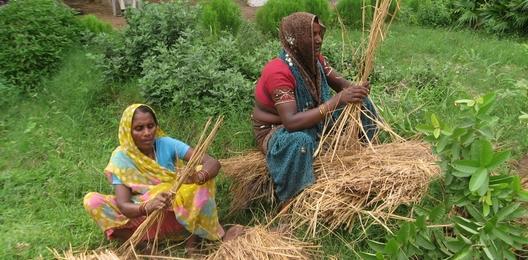
Environment and Biodiversity
Place
Bargarh (Uttar Pradesh), India
Sponsor
Brune Poirson
Grant(s)
20 000 € to the Selection Committee at 2012/06/05
Project leader
"Thanks to his academic career, Alexis Roman, the founder of Rain Drop, has a powerful capacity for technical analysis, project setup and management, added to intense motivation and a sense of team management. This has enabled him to gather together a team of persons possessing complementary skills (engineer, environmental expert, NGO, etc.)."
Brune Poirson
After two centuries of deforestation, Bargarh, located in Uttar Pradesh, in northern India, one of the country's poorest regions, suffers rampant desertification. The soils are eroding, the monsoon is unreliable, and the water resources are shrinking. The native population and the lower castes who live there depend exclusively on the monsoon rains for farming, their chief means of subsistence. Desertification increases the pressure on a population already beset by difficulties because of their position at the bottom of the Indian social and economic ladder.
Faced with this situation, and the anxiety of the inhabitants experiencing their 7th year of drought, the nonprofit Rain Drop was created by Alexis Roman in March 2010 to improve their living conditions through the participative management of natural resources, especially water. The founder of Rain Drop used his fluency in Hindi and his knowledge of local customs, gained by a shared experience of everyday life, to create solid bonds with the villagers, particularly the village heads and the local authorities, as well as NGOs and local experts. They have accordingly drawn up an action plan together and opted for the construction or restoration of the rainwater recovery structures, a traditional Indian method, and reforestation processes, with multipurpose trees, which provide an additional income while revitalizing the local environment.
At the same time, Rain Drop is launching awareness raising campaigns in France on the environment and cultural diversity, with events in the schools and projections of photographs and documentaries produced at Bargarh. While providing material aid to the most destitute populations, the nonprofit feels that it is indispensible to broaden the awareness of people in the industrialized countries of the scale of the environmental challenges.
Water from the heavens and trees to conserve it
Following a pilot year in 2010 and 2011, the Rain Drop project has been extended to five new villages for a second year, with the aim of building or repairing two water recovery tanks and planting 5 000 trees for the benefit of 2 600 villagers. The project includes four major phases over 2012/2013, aimed at structuring the organization's approach in the field in order to maximize its concrete impact:
- mobilization of the villages: the project demands the active participation of the local population and a reinforcement of their capacity to mobilize, enabling them to contend better with future changes;
- awareness raising campaigns and management workshops on natural resources;
- construction of rainwater recovery tanks and protection of the plantation land (stone walls to prevent castle rustling): rainwater recovery and tree planting provide one way to revitalize the local environment while ensuring access to water for the basic needs of the local population and for irrigation;
- planting of trees and vegetables: by planting fruit and medicinal trees and vegetables on unused land, Rain Drop restores the soil while diversifying the sources of income for the villagers.
The nonprofit has enlisted the expertise and help of corporations and NGOs of the environmental sector, which led to concrete partnerships with which the Veolia Foundation is associated, particularly for the construction of the water recovery tanks.

